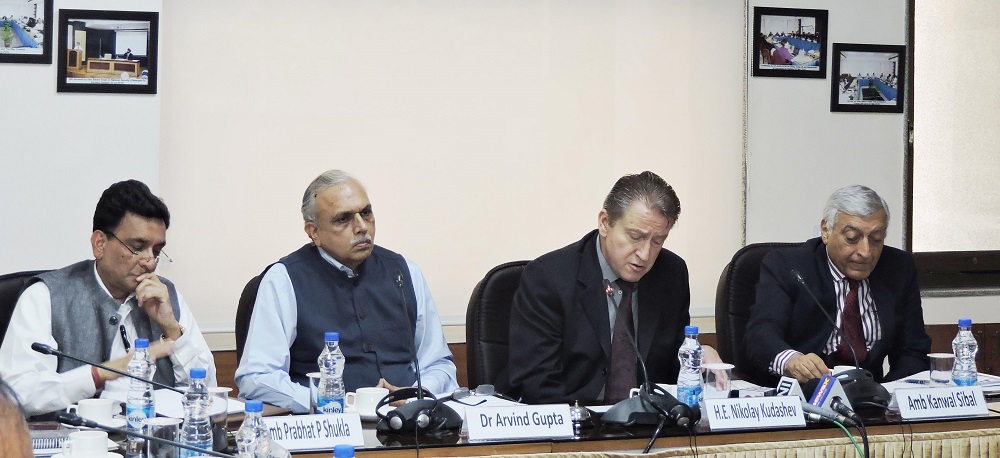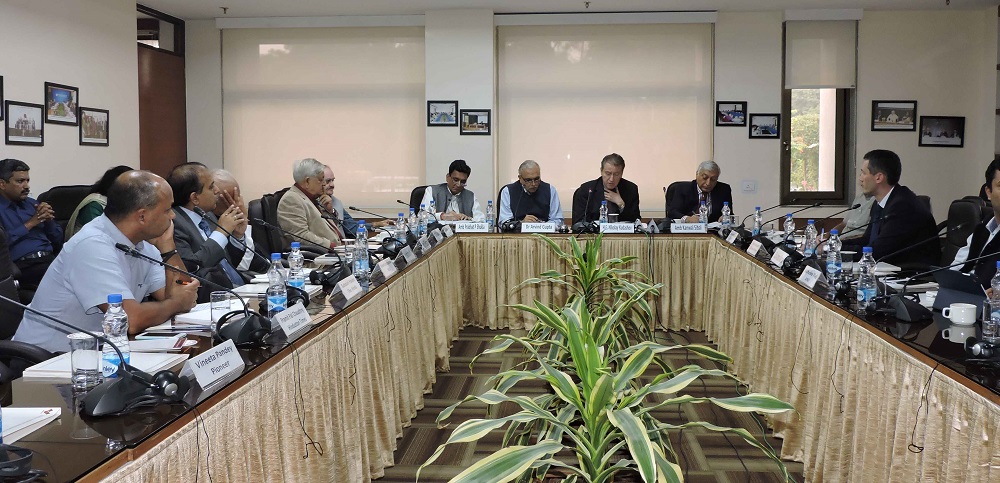A panel discussion to the release of the report "70th Anniversary of Russia-India Diplomatic Relations: New Horizons of Privileged Partnership", jointly prepared by the Vivekananda International Foundation (VIF) and the Russian International Affairs Council (RIAC), took place at the VIF on November 7, 2017. The Report was earlier released in Moscow by India’s Ambassador to Russia, HE Mr. Pankaj Saran on 11 October 2017 and has opened up a new discussion on the prospects of Russia-India relations and the steps required to develop them further.
Dr. Arvind Gupta, Director of the VIF made the opening remarks and also moderated the discussion. He spoke about the current state and prospects for India-Russia ties and suggested that Russia should actively participate in India’s ‘Make in India’ programme in defence manufacturing, with more technology transfers, as that would consolidate Russia’s position as India’s economic partner as was the case during the Soviet times. HE Mr Nikolay R Kudashev, Ambassador of Russia to India, Mr. G V Srinivas, Joint Secretary, Eurasia Division, Ministry of External Affairs (MEA), representatives from the National Security Council Secretariat, senior members from Delhi’s strategic community and select representatives from the media were present on the occasion. The co-authors of the Report, former Foreign Secretary, Ambassador Kanwal Sibal and Ambassador P P Shukla, along with representatives of Delhi’s strategic community took part in the discussion. RIAC Director A.V. Kortunov and Mr. G Balasubramanian, Deputy Chief of Mission of the Embassy of India in Russia, addressed the audience with welcome remarks from Moscow through a video conference.

The discussion covered the key aspects of interaction between Moscow and New Delhi, which recently has been most successful in nuclear power, oil and gas as well as military and military-technical spheres. Noting frequent political contacts at the highest and high levels, the participants stressed the need to increase bilateral trade and mutual investments. The Report highlights that while Russia and India enjoy a special and privileged partnership based on deep trust and understanding, there is a need to do more to forge common positions at various bilateral and international fora. To achieve substantial progress in bilateral relations it is necessary to renew their strategic paradigm by working on a range of cooperation projects that meet the new economic needs of Russia and India as this will make a qualitative leap in economic ties possible. It has also been suggested that joint initiatives should be based on the global competitive edge of both countries through transition to new development models. The cooperation mechanisms must be revised to adapt to new realities. The ultimate goal of this revision is to make Russia–India relations independent of their ties with third countries and impervious to crises and changes in global circumstances.

Another highlight of the Report is the emphasis to further expand Russia–India engagement on the international arena and to strengthen international groups such as the Shanghai Cooperation Organisation (SCO) and Brazil, Russia, India, China and South Africa (BRICS), where China seems to dominate to the detriment of India. India has suggested that ideally, Russia should continue to actively support India’s claim for greater participation in international affairs, particularly in reforming the United Nations, expanding the number of permanent members in the Security Council and membership of technology-related international regimes of which Russia is a member. The Report also recommends the need to build an economic stake by both Governments in this relationship. It recognizes the importance of increasing the efficiency of existing economic cooperation mechanisms at all levels – by encouraging direct contacts between the business communities of the two countries. Both need to look at ways to strengthen industrial cooperation and create close technological alliances and integrated manufacturing chains in those sectors where both Russia and India have significant capacities in terms of personnel and resources.
In conclusion, Dr. Arvind Gupta, Ambassador Nikolay Kudashev and other panelists highlighted the importance of such events, which encourage stronger contacts between the expert circles of Russia and India. They also expressed the hope that ideas and recommendations expressed in the Report would provide the necessary expert support for state level contacts and will be helpful in foreign policy decision-making by the two governments.



